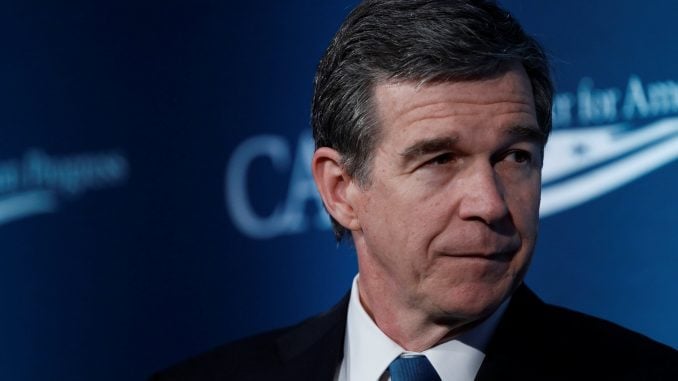
RALEIGH —Republican budget writers at the North Carolina General Assembly on Monday held a press conference introducing their $24 billion compromise budget after debating differences between Senate and House priorities.
A compromise with Gov. Roy Cooper on his priorities, however, is not represented in the deal, and legislative leaders say that’s because he has refused to work with them on creating concrete positions on which to negotiate.
“The House and the Senate have reached an agreement on a budget,” Senate Leader Phil Berger (R-Eden) said at the press conference. “The specifics could change; in fact, I hope they do change based on specific compromise proposals, if we receive them, from the governor.”
Berger said legislative leaders have been asking Cooper to give them his proposals for weeks, “but he has not done so.”
Cooper wrote Berger and Speaker Tim Moore (R-Kings Mountain) a letter the previous evening asking them to delay the budget until after the current fiscal year ends, but Berger responded: ”We don’t believe that’s responsible, but we can change the budget at any time if we get a legitimate counteroffer.”
The deadline to present a budget before the end of the fiscal year is June 30, so time is running short to meet that time frame.
Democratic leaders, including Cooper, say they are giving feedback on the process, and their main priority is Medicaid expansion.
“We want a budget that invests in teacher pay instead of more tax cuts for corporations, that has a school and infrastructure bond instead of a slush fund, and that includes Medicaid expansion to insure 500,000 more North Carolinians,” said Ford Porter, spokesperson for Cooper, in a statement. “Right now, legislative Republicans are not interested in serious negotiations on these issues, but we hope they will change their minds and agree to put everything on the table as Governor Cooper has.”
Within the budget, there is a provision for a special session on health access which, according to Berger, could include discussion on Medicaid expansion.
Republicans say they agree with Democrats on the need to improve health access, but they wish to reform rather than expand Medicaid, the federally- mandated program providing lower-income residents health coverage.
“Fixing the current Medicaid problem is my priority,” Rep. Donny Lambeth (R-Forsyth), a House budget leader, said in a statement. “We had significant cost overruns, but we have a plan for transformation and we are getting it done. I can’t oversell how difficult that will be.”
Expansion under the 2010 federal health care law would provide hundreds of thousands of low-income people with Medicaid coverage, most of whom are able-bodied adults. Proponents of expansion say it would also inject money into struggling rural hospitals and economies.
Republicans cite financial uncertainty from Washington with Medicaid expansion and a preference to work on other health care access improvements. For example, Republicans seek next week to advance separate legislation that would offer state-funded loans to rural hospitals in financial crisis.
Highlights of the $24 billion budget include salary increases of an average of 3.9% for teachers and 5% for state employees. Assuming the passage of this budget, teachers will have received a 20% increase in the last five years, and state employees will have received 7.6%.
While teacher protests have been a regular event, under the current leadership, North Carolina has moved from 47th in the nation in teacher pay to 29th, according to the national teachers union NEA.
For infrastructure spending on K-12 schools, the budget commits $4.4 billion over the next 10 years. In total, the budget allocates $14.2 billion for public education, which Moore said is, “the highest in the state’s history,” as he pointed at a chart during the press conference.
Moore also said the budget would continue the “tax reform and the tax cuts we’ve seen move the state forward.” The standard deduction would be increased under this bill to $21,000.
The proposed budget also adds an additional $710 million to the rainy-day fund, which had been depleted from recent hurricane recovery needs.
Without the governor’s support, the budget is likely to be vetoed. After the loss of Republican supermajorities, a veto override is a major lift on Jones Street. But Cooper vetoed the budget last year and Democrats joined Republicans to override that veto.
The Associated Press contributed to this report.


